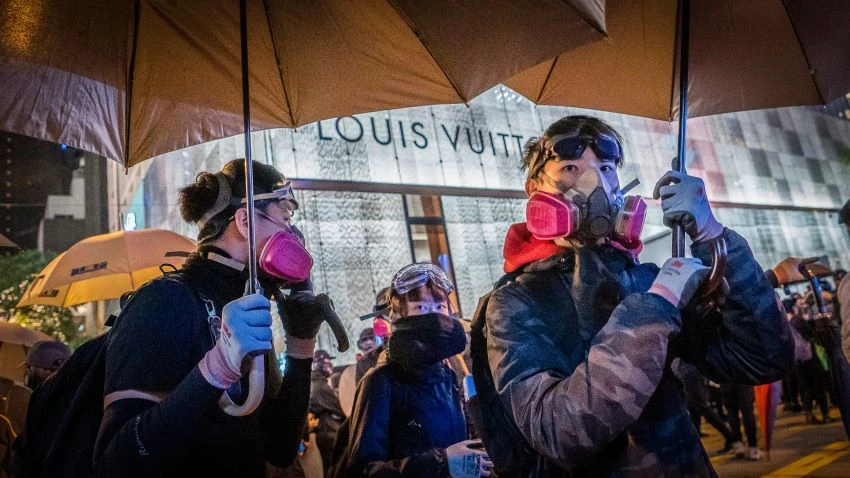
Angelise Wu, a 31-year-old Beijinger, canceled her regular shopping excursion to Hong Kong this year. In addition to worrying about her safety amid the anti-government demonstrations, she also took issue with what she called the "disobedient attitude" of locals, which made her uncomfortable.
"I won't buy luxuries in Hong Kong in the future even after the protests end," Wu said. "I just don't feel like contributing to its economy."
Instead, Wu, who normally spends thousands of dollars on luxury products every year for her family, got her leather bags elsewhere: Thailand, South Korea and Japan.
"Most shops there have salespersons who speak Chinese, and they are very friendly to Chinese tourists," she said. Wu said that she had also bought from mainland shops because the price gap with Hong Kong is not as wide as it used to be.
This change of heart by consumers such as Wu is ringing alarm bells for multiple global luxury brands that have looked to Hong Kong to provide as much as 10% of their annual sales. The city's reputation as a go-to place for Chinese luxury shoppers has been seriously challenged by the protests, now in their seventh month. Many brands are re-evaluating Hong Kong's strategic relevance as mainland tourists look elsewhere for their shopping.
"We believe that the luxury landscape of Hong Kong will be profoundly reshaped," said Claudia D'Arpizio, partner at Bain & Company in Milan and lead writer of the company's annual luxury report. She believes Hong Kong's luxury market will find a "new equilibrium" through fewer physical stores and a refocus on "catering to local consumers."
 Protesters hold lights during a rally in September to call for political reforms in Hong Kong. Many brands are re-evaluating the city's strategic relevance as mainland tourists look elsewhere for their shopping. © Reuters
Protesters hold lights during a rally in September to call for political reforms in Hong Kong. Many brands are re-evaluating the city's strategic relevance as mainland tourists look elsewhere for their shopping. © Reuters A shift of that size is potentially huge. Mainland customers account for roughly half of all luxury retail shopping in Hong Kong, Morgan Stanley estimates. But the political unrest has seen their visits to the city fall 46% in October from a year earlier, government statistics show.
Sales of luxury items fell more than 40% in the three months ending October. Looking at the full year, D'Arpizio expects that the smaller number of mainland tourists will slice a fifth off luxury sales to around 6 billion euros ($6.7 billion), down almost 40% from the 2013 peak.
Back then, the city's exposure to mainland tourists was its biggest selling point for luxury brands. To capture the rising spending power of mainland Chinese, brands expanded store networks aggressively, outfitting prime spaces with whopping rents. The city of more than 7 million people now has some 1,000 mono luxury stores.
But perhaps not for much longer.
Prada, which blamed Hong Kong's unrest for dragging sales growth in all of greater China into the red when it reported its June interim results, will end the lease of its flagship store in the tony Causeway Bay district next year, according to local media. That single store is currently costing the Italian fashion house 9 million Hong Kong dollars (US$1.2 million) in rent every month. Its landlord is offering a 44% rental cut as it searches for a new tenant.
Burberry, which has said its Hong Kong sales suffered a "double digit" percentage decline in the six months to September, has not made any plans to close shops or lay off workers. But Marco Gobbetti, Burberry's CEO, recently warned that "we have to be very, very, very careful" about Hong Kong.
That gloomy experience is being repeated throughout the sector.
 A Burberry store in the Causeway Bay shopping district. The company’s CEO, Marco Gobbetti, recently warned that "we have to be very, very, very careful" about Hong Kong. © Reuters
A Burberry store in the Causeway Bay shopping district. The company’s CEO, Marco Gobbetti, recently warned that "we have to be very, very, very careful" about Hong Kong. © Reuters LVMH, owner of Louis Vuitton, reported a 25% decline in its Hong Kong sales in its July-September quarter, while Kering Group, owner of Gucci, saw its sales shrink 35%. Tiffany, which once counted Hong Kong as its fourth-biggest market after the U.S., Japan and mainland China, said sales slumped by almost half between August and October. The protests caused six full shopping days of unplanned store closures.
To be sure, Hong Kong's luxury sales have suffered challenges before. When Chinese President Xi Jinping launched an anti-corruption campaign in 2013, sales dropped by 14% the following year as many government officials shied away from accepting valuable gifts from people hoping to get preferential treatment.
Sales eventually rebounded as mainland tourists that wanted to shop for themselves -- as opposed to those who bought expensive presents to curry favor with officials -- continued to visit the city. But this time is different, and analysts say that more brands will have to take action.
"Most brands are structured in Hong Kong to serve large numbers of Chinese tourists," Luca Solca, managing director of luxury goods at Sanford C. Bernstein Schweiz said. "Trimming retail networks in Hong Kong may make sense to a number of brands."
Instead, more stores in China may take their place. "Luxury brands already have strong retail networks in most parts of China," Solca said.
Some brands are already moving their focus to the mainland.
Chow Tai Fook Jewellery Group, Hong Kong's largest jeweler, will close up to 15 city outlets next year, said Kent Wong, managing director of the group, after sales in Hong Kong and Macao slumped 48% between October to mid-November compared with the previous year.
Instead, it has opened more than 300 stores on the mainland in the six months through to September. Hong Kong's contribution to group sales has dropped to 32% from 47% in 2013.
 A Chow Tai Fook jewelry store in Hong Kong. The company, Hong Kong’s largest jeweler, will close up to 15 city outlets next year following a big slump in sales. © Reuters
A Chow Tai Fook jewelry store in Hong Kong. The company, Hong Kong’s largest jeweler, will close up to 15 city outlets next year following a big slump in sales. © Reuters One reason why this change makes commercial sense is that more Chinese customers now buy luxury items at home due to the diminishing price gap between Hong Kong and mainland China or other Asian markets, said Emily Lee, head of China and Hong Kong consumption research at Nomura.
Beijing has lowered the tax on luxury goods several times in recent years to boost domestic consumption, which has prompted luxury brands in turn to lower their retail prices on the mainland.
Indeed, Morgan Stanley estimates that the price in mainland China of 23 popular items made by 10 luxury brands is only 5% higher than that in Hong Kong, while other Asian markets are 10% higher. As a result, only 6% of China's first-time travelers overseas say they would choose Hong Kong as their destination, compared with 16% in 2013.
Thailand and South Korea, both of which offer visa-free entry for Chinese passport holders in parts of their countries, are among the most popular alternatives. Landlords of high-end malls in Hong Kong will have to adjust. Both Swire Properties and Hong Kong Land say they are offering temporary rental relief to retail tenants on a case-by-case basis.
"We believe that business will return to normal in due course," said a spokesperson at Swire Properties, adding that the company remains confident that the city remains a long-term shopping destination.
A spokesperson at Hong Kong Land, operator of several malls in the high-rent Central business district, said that "adjusting tenant mix from time to time in response to market changes has been a long-standing strategy," and added that it was "not appropriate" to alter its portfolio there.
But Annie Yau Tse, chairwoman of the Hong Kong Retail Management Association, an industry body whose members run more than 8,000 retail outlets, disagrees. She believes the rental reduction made by most landlords so far is not enough.
"After months of social unrest, the luxury brands are now very cautious," she said, and their commitment to the Hong Kong market, already tested by political uncertainties, will be strained further by high rents.
Emily Lee of Nomura estimates that brands will need rental reductions of more than 50% to retain their existing outlets.
Meanwhile, the lives of thousands of workers employed in Hong Kong's glittering, but now often empty, shops have changed. The lengthy queues that used to stretch outside the luxury boutiques on famed Canton Road in the Tsim Sha Tsui shopping district have disappeared, despite sales offering as much as 50% off.
A 35-year-old saleswoman at Valentino, the Italian luxury brand, said sales have dropped some 40% in the past few months due to the decline of mainland tourists. And a rise in customers from Taiwan and Japan has not been enough to pick up the slack.
"Personally, I think the situation right now is not too bad," the saleswoman said, as her workload and the traffic has improved significantly, while her salary has remained stable. She recalled an ordinary working day back in 2013 when she barely had time to go to the bathroom or to lunch.
"Everyone is more comfortable, I think," she said.




















